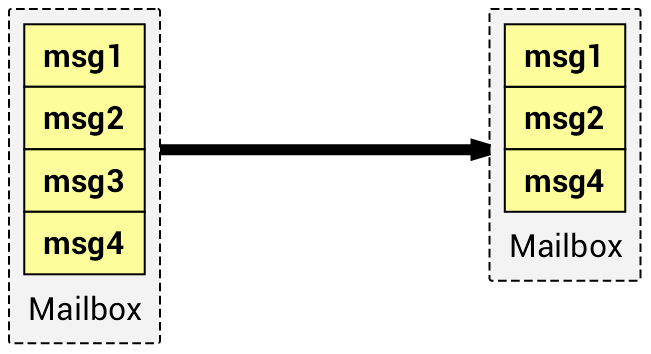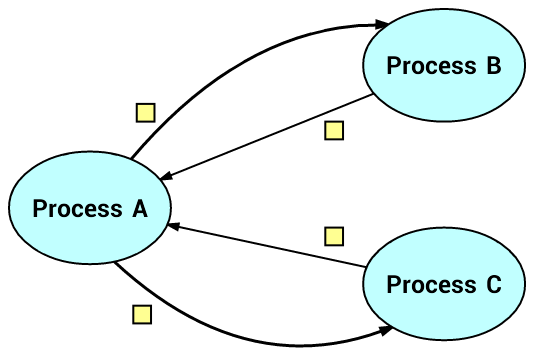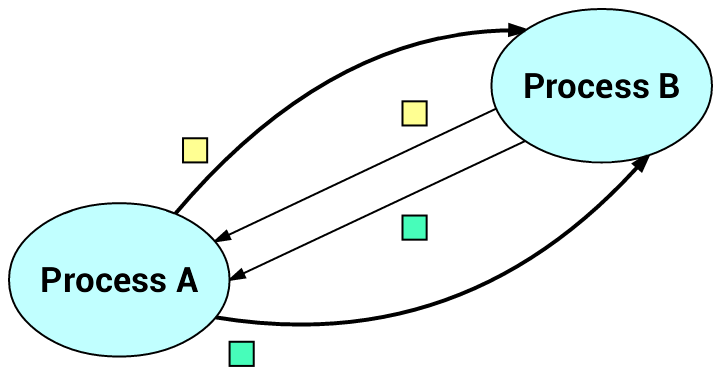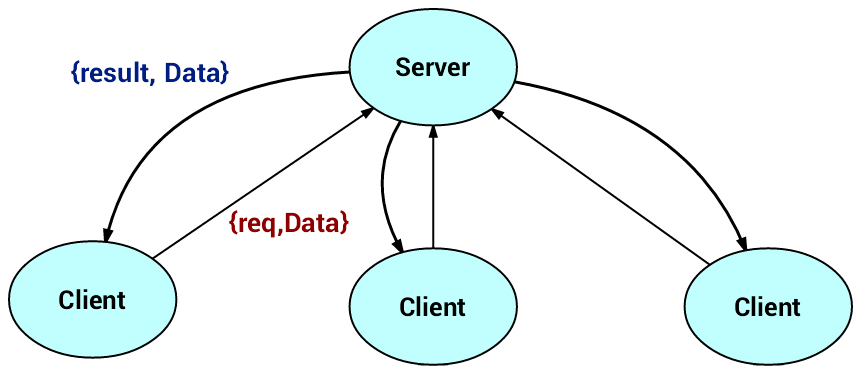Reacting to multiple messages
Erlang has the ability to "listen" for messages from different senders
In which order will they be process?
Can we force an order?
The semantics for a
receivestatementA receive statement tries to find a match as early in the mailbox as it can
receive msg3 -> 42 end

Another example
receive msg4 -> 42 end

Waiting for multiple messages
receive msg4 -> 42 _ -> 41 end
The
_matches with any message in the mailbox.
- The oldest message is tried against every pattern of the receive until one of them matches.
Sources of multiple messages
Multiple messages can come from different processes (code)

-module(echo2). -export([start/0]). echo() -> receive {From, Msg} -> timer:sleep(random:uniform(100)), From ! {self(), Msg}, echo(); stop -> true end. start() -> PidB = spawn(fun echo/0), PidC = spawn(fun echo/0), % sending tokens Token = 42, PidB ! {self(), Token}, io:format("Sent~w~n",[Token]), Token2 = 41, PidC ! {self(), Token2}, io:format("Sent~w~n",[Token2]), % receive messages receive {PidB, Msg} -> io:format("Received from B: ~w~n", [Msg]) ; {PidC, Msg} -> io:format("Received from C: ~w~n", [Msg]) end, % stop echo-servers PidB ! stop, PidC ! stop.Function
timer:sleep(N)sleeps a process forNmillisecondsFunction
random:uniform(N)produces a random integer between1andNDistinguish the source by
Pids
Multiple messages can come from the same processes (code)
Erlang has asynchronous messages
Send several messages of the same shape and continue computing

When receiving the responses, how can the code match them to the appropriate request?
-module(echo3). -export([start/0]). echo() -> receive {From, Msg} -> From ! {self(), Msg}, echo(); stop -> true end. start() -> PidB = spawn(fun echo/0), % sending tokens Token = 42, PidB ! {self(), Token}, io:format("Sent~w~n",[Token]), Token2 = 41, PidB ! {self(), Token2}, io:format("Sent~w~n",[Token2]), % receive messages receive {PidB, Msg} -> io:format("Received 41? ~w~n", [Msg]) ; {PidB, Msg} -> io:format("Received 42? ~w~n", [Msg]) end, % stop echo-servers PidB ! stop.BIF
make_refprovides globally unique reference objects (references for short) different from every other object in the Erlang system including remote nodesReferences can be used to uniquely identify messages! (code)
-module(echo4). -export([start/0]). echo() -> receive {From, Ref, Msg} -> From ! {self(), Ref, Msg}, echo(); stop -> true end. start() -> PidB = spawn(fun echo/0), % sending tokens Token = 42, Ref = make_ref(), PidB ! {self(), Ref, Token}, io:format("Sent~w~n",[Token]), Token2 = 41, Ref2 = make_ref(), PidB ! {self(), Token2}, io:format("Sent~w~n",[Token2]), % receive messages receive {PidB, Ref2, Msg} -> io:format("Received 41? ~w~n", [Msg]) ; {PidB, Ref, Msg} -> io:format("Received 42? ~w~n", [Msg]) end, % stop echo-servers PidB ! stop.
Selective receive
Clauses can have guards
Guards must be composed from terminating functions (BIFs)
receive
{Pid, Ref, N} when N>0 -> ...
Client-Server Architecture
Common asynchronous communication pattern
- For example: a web server handles requests
for web pages from clients (web browsers)

- For example: a web server handles requests
Mathematical server
Off-loading heavy mathematical operations
- For example: factorial
Server code
loop(Count) -> receive stop -> true ; {get_count, From, Ref} -> From ! {result, Ref, Count}, loop(Count); {factorial, From, Ref, N} -> Result = factorial(N), From ! {result, Ref, Result}, loop(Count+1) end. % starting server with initial state 0 start() -> spawn(fun() -> loop(0) end).Client code
compute_factorial(Pid, N) -> Ref = make_ref(), Pid ! {factorial, self(), Ref, N}, receive {result, Ref, Result} -> Result end.A simple test
> c(math_examples). {ok,math_examples} > math_examples:factorial(10). 3628800 > mserver:start(). <0.40.0> > mserver:compute_factorial(list_to_pid("<0.40.0>"),10). 3628800What if the server crashes or stop?
> list_to_pid("<0.40.0>") ! stop > mserver:compute_factorial(list_to_pid("<0.40.0>"),10). * 2: syntax error before: mserver > mserver:start(). <0.44.0> > mserver:compute_factorial(list_to_pid("<0.44.0>"),10). 3628800Processes IDs are dynamic but code is static!
- Change in a process ID might lead to notify all the potential clients
Registered processes
Erlang has a method for publishing a process identifier
- Any other process can communicate with it
BIF
register% starting server with initial state 0 start() -> Pid = spawn(fun() -> loop(0) end), register(server,Pid).The atom
servercan be used instead of a concrete process ID> mserver2:start(). true > mserver2:compute_factorial(server,10). 3628800 > server ! stop. stop > mserver2:compute_factorial(server,10). ** exception error: bad argument in function mserver2:compute_factorial/2 > mserver2:start(). true > mserver2:compute_factorial(server,10). 3628800
Distributed environments
Message passing abstractions extend easily for distributed environments
Erlang nodes
An instance of an Erlang runtime system
Nodes can easily communicate with each other
Creating a node
erl -name 'nodeS@127.0.0.1' -setcookie lecture
- The cookie provides security (not everyone can connect)
- The name reflects the node's IP address
Creating two nodes (for simplicity on the same machine)
erl -name 'nodeS@127.0.0.1' -setcookie lecture erl -name 'nodeC@127.0.0.1' -setcookie lecture
Connecting nodes
- From
nodeC@127.0.0.1
(nodeC@127.0.0.1)> net_adm:ping('nodeS@127.0.0.1'). pong (nodeC@127.0.0.1)> nodes(). ['nodeS@127.0.0.1']- From
Distributed mathematical server
Running your code
- Send the compiled version of your code to the connected nodes
(nodeC@127.0.0.1)> nl(math_examples). abcast (nodeC@127.0.0.1)> nl(mserver2). abcast
- The server gets started on the
nodeSnode
(nodeS@127.0.0.1)> mserver2:start(). true
- The client communicates with the server
(nodeC@127.0.0.1)> mserver2:compute_factorial({server, 'nodeS@127.0.0.1'}, 10). 3628800Use of
{registered_name, node@IP}instead of the process ID (e.g.<0.47.0>) or only the registered name (e.g.server)The code has not been changed for running in a distributed setting!